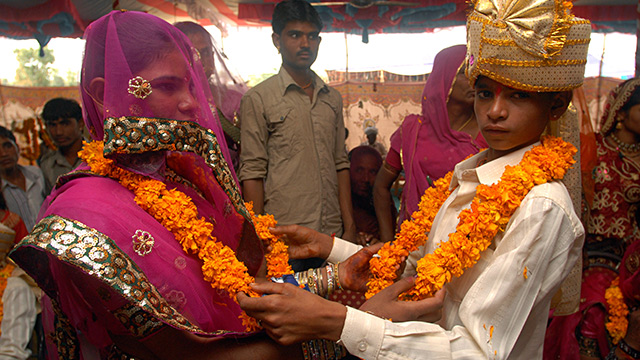
MANILA, Philippines – Saanvi, not her real name, belonged to a traditional Indian family. She wears a veil, does not talk to men in their community, and she got married at age 14.
“When I came to my in-laws’ house, I was forced to work as their servant every day,” she told Walk Free Foundation (WFF), an international group that fights to end modern slavery.
The International Center for Research on Women (ICRW) considers India as a hot spot for child marriages where 47% of girls are married before hitting the legal of age of 18.
Saanvi is just among the millions of girls – not only in India, but in several nations – who were forcedly wed at a very young age.
“The control of women’s sexuality in many societies leads to forced marriage and commercial sexual exploitation,” said WFF’s Global Slavery Index report.
“Forced and child marriage persists in countries throughout the region, particularly in India, Bangladesh, Nepal, Pakistan and Indonesia,” it added.
Citing estimates from the United Nations, the report said there are more than 130 million South Asian girls who will be married between 2010 and 2030.
Bride trafficking
Like Saanvi, women in forced marriages in India are also exposed to labor exploitation since they are used as laborers who are unpaid. And in various instances, these brides are from rural areas who are trafficked to the cities in hopes of employment.
“Local day laborers cost $140 for a season but a bride can cost only $100 as a once-off payment,” the report said.
Indian women are being brought to urban centers because there are more women of “marriageable age” in the provinces than the cities.
This sexual imbalance that promoted bride trafficking is also pronounced in China, which formerly employed a one-child policy. The state lifted its restriction in October last year, allowing couples to bear two children because of its aging population.
The policy has also led to a shortage of women eligible for marriage, leading to the entry of women and girls from nearby countries such as Cambodia, Vietnam, and North Korea, who were sold as brides.
Stopping forced and child marriage
Last March, 13 countries in the Asia-Pacific Region approved the Kathmandu Declaration in efforts to curb the continuing forced and child marriage.
The formal agreement recognizes “early, child and forced marriage as a grave violation of fundamental human rights and an unlawful harmful practice.”
Through these, countries such as Bangladesh, India, Nepal and Pakistan have conceded to “create holistic, effective and sustainable solutions” to end “the root causes of early, child, and forced marriage.”
But despite this, the approving countries have yet to legislate policies that could curb the prevalence of child marriages.
India, the report noted, still has to finalize its national plan in preventing child marriages, while Bangladesh is still developing its own.
Nepal’s national plan to end the inhumane phenomenon is awaiting government endorsement. And Pakistan has yet to raise the legal age for marriage in its rural areas. – Rappler.com